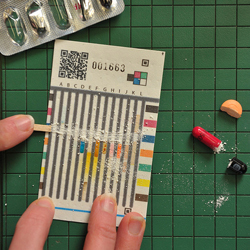

Marya Lieberman, associate professor of chemistry and biochemistry and member of the Eck Institute for Global Health, was awarded the inaugural Partners for Progress Prosperity (P3) Award at the American Chemical Society (ACS) 2015 Joint Great Lakes/Central Regional Meeting on Friday (May 29). She was recognized for her partnerships with Moi Teaching and Referral Hospital in Kenya and Chemists Without Borders.
Lieberman leads the Paper Analytical Device (PAD) Project at Notre Dame, an initiative that created and provides paper-based chemical analysis tools for low-resource settings around the world. The paper test cards are being used by Moi Teaching Hospital and around Kenya to screen for low-quality drugs.
The World Health Organization estimates that 10 percent to 30 percent of human medications are of poor quality. Currently, there is no global system to continuously monitor the quality of pharmaceuticals, so it is difficult to estimate how prevalent they are, how many patients purchase and take them, and how these medications are entering the market. Many parts of the developing world do not have the technological and regulatory infrastructure needed to keep the poor or falsified medications off the market.

The PADs are very inexpensive and easy to use. Each PAD is coated with reagents to test the chemicals present in a medication. Pills are simply swiped across the midpoint of the card, and then the card is placed in water. The water is absorbed into the card and produces a color pattern that is analyzed to determine the quality of the medication. In addition to testing for counterfeit drugs, the PAD technology is being used to create iodine deficiency tests.
The P3 Award was established to encourage and recognize successful and exemplary partnerships and is awarded by local ACS sections. To be considered for the award, partnerships must result in impactful outcomes that improve the public perception and appreciation for chemistry, promote career advancement opportunities and/or support entrepreneurship in the chemistry enterprise, advance advocacy efforts with government and though leaders, or support STEM (science, technology, engineering, and mathematics) education or research.
Originally published by at science.nd.edu on June 04, 2015.